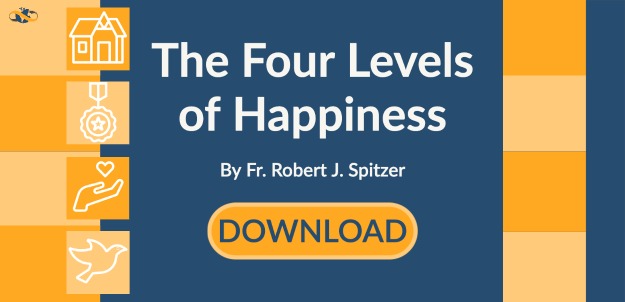Our definition of happiness will determine all of our choices and priorities, shape our outlook, and even determine our destiny. The desire for happiness is the root and driver of all human behavior; the ultimate fulfillment of all desires; the only goal that people pursue for its own sake. It is also the fundamental catalyst for a life of holiness, the deepest longing of the human heart.
Remembering Brian Wilson and the Power of Music
With the passing of Brian Wilson recently, it caused me to step back and reflect. While I appreciate the perseverance of Mike Love, Al Jardine, Bruce Johnston, and others who have picked up the mantle over the years, a core component of the Beach Boys’ legacy is largely a memory now; all three brothers, Dennis, Carl, and Brian, are gone now. From that perspective alone, it tends to cause one to consider one’s own mortality and that of those around us, and thus we ought to embrace the connections with family and friends and how we need to appreciate and look for the good news in them while we’re all here.
Beyond that, I was simply a fan of the Beach Boys and still am, actually. I’ve seen them numerous times in concert over the years, and like many others, appreciate how their music spoke to me at a variety of levels. After all, their music has endured for over 60 years, so it must mean something to many people. Then it struck me. . . maybe that’s why their music resonated. The variety of songs that Brian Wilson and the Beach Boys wrote and produced reflected elements of all four forms of happiness and spoke to the challenges we all face at various times in our lives, from our teens and into adulthood.
If you would humor me for a moment, I’d like to explore this a bit more. What was it about the music of the Beach Boys that appealed to many aspects of our lives and what makes us happy, and maybe even helped us get through some tough times?
Level 1 Happiness: Surf, Cars, and Good Times
At Level 1, many of the songs were good for simply letting go and being distracted from our troubles. Even though I grew up a couple thousand miles away (while there are plenty of beaches, there are not a whole lot of opportunities for surfing on the Great Lakes), the upbeat mood of the surfing sound just appealed to me. To this day, I can still “sing” along to the lyrics of "Surfing USA," "Surfin’ Safari," "California Girls," etc.
I was/am also a “car guy,” so their car songs like Little Deuce Coupe, 409, Shut Down, Little GTO, etc., really struck a chord (no pun intended). And other songs reflected that fundamental desire to simply have some fun:
- "Dance, Dance, Dance"
- "Rock and Roll Music"
- "Do You Wanna Dance"
- "Fun, Fun, Fun"
Level 1 fulfillment is good. Typically, it provides for the satisfaction of our basic desires. After all, what’s life without a little fun? But it’s not something we can ultimately live for in and of itself. As we mature, just having fun feels a bit empty and unsatisfying (and can get out of control); we need something more. Usually, the next step is looking for things that build our confidence and self-esteem at Level 2.
Level 2 Happiness: Competition and Validation
Those car songs also appealed to my basic competitive inclinations. I liked the songs that spoke to how the GM muscle cars could beat the Fords and Mopars, LOL. However, beyond that, our Level 2 drive for validation was showcased in songs like "I Get Around" and "Be True to Your School," among others.
While it’s important to build our ego and self-esteem, if this form of happiness becomes our primary goal in life, we again soon begin to feel emptiness and a lack of direction. As we continue to mature, we begin to understand and seek a greater sense of purpose and connection with others.
Level 3 Happiness: Connection, Love, and Empathy
Even though the surfing and car songs were iconic, if you dug into their songbook, there is even more music that appeals to our Level 3 desires for relationship, connection, love, etc., and even Level 4 to an extent. Many things we all struggled with during our teens and into early adulthood—and maybe even beyond—are reflected in their lyrics.
While largely written off as simply teenage angst, there is obviously something to the sentiments in their music that was very appealing, and prompts us to pay attention..
I’m not a psychologist, I don’t even play one on TV, so I’m just going to throw some ideas out there for consideration. Teenagers, for time immemorial, have dealt with the challenges, both physically and mentally, of the transition into adulthood. So, this “angst” is nothing new. But has the way we deal with it changed? What do our kids today have to help deal with this angst? Why does it seem like we’re hearing more about addictions or, even worse, suicide?
These tragedies have always existed; maybe we just hear more about them today because of our access to information. Still. . . is there more to the story?
How Music Once Helped Us Understand Ourselves
“Teenage angst is the feeling of being overwhelmed, anxious, rejected, or even unwanted. Teens can feel better by understanding what is common, and what are greater concerns than the average teenage development.” —Teenage Angst: Causes, Getting Help, & 10 Ways to Cope by Lena Suarez-Angelino, LCSW
One of the ways that teens used to “understand what is common” was through music. In doing a bit of research, I found that most music that speaks to these teenage challenges fall in the era of the 1960s through the 1970s and into 1980s, and many of them are a bit intense, e.g., Joni Mitchell, Bruce Springsteen, the Ramones, and even Teenage Lobotomy (yikes). But the Beach Boys tended to hit a more contemplative and empathetic tone. . . both lyrically and musically.
Level 4 Happiness: Yearning for the Transcendent
In the Four Levels of Happiness, we acknowledge that the dominant form of desire/fulfillment/happiness these days is Level 2, and when that’s the case, there’s no good outcome. And, it seems like outlets such as social media and TikTok tend to exacerbate this predisposition rather than help.
In contrast, the music of a group like the Beach Boys offered the reassurance that we’re not alone in our struggles. Teenage yearnings and heartbreak expressed in songs like "Little Surfer Girl," "Wouldn’t It Be Nice," "When I Grow Up to Be a Man," "Don’t Worry Baby," "Warmth of the Sun," etc., communicated an “understanding of what is common” in terms of teenage sensibilities.
Even songs like In My Room and God Only Knows bordered on appeals to a divine protector that speaks to our deepest and most profound form of desire at Level 4.
In My Room, for example, provides assurance that I’m not the only one dealing with this “stuff”, and offers hope by putting things into perspective, consider the lyrics:
“ . . . do my crying and my sighing, laugh at yesterday . . . ”
The song also appealed to our desire for a more transcendent connection through contemplation and prayer:
“ . . . do my dreaming and my scheming, lie awake and pray . . . ”
I would also argue that there is something more profound behind the raw lyrics of some of their music. For example, "The Warmth of the Sun" speaks to the loss of a temporal love, yet . . .
“Still, I have the warmth of the Sun within me tonight . . . ”
Which I suggest acknowledges a transcendent source of peace.
Modern Distractions and the Danger of Shallow Escape
Finding succor in pop music over the years may be a good temporary pacifier for the trials and tribulations of the day, but it is NOT the ultimate solution. Almost 50 years ago, Dr. Viktor Frankl spoke about the loss of purpose and meaning in the lives of youth leading to suicide (Frankl Interview). It’s very striking to hear him refer to the surprisingly low rate of suicide in the concentration camps of World War II compared to the youth in affluent and welfare states of contemporary societies.
All of us need to have some sense of meaning and purpose (Level 3 and Level 4) that helps to provide context to the trials and tensions of life. If our youth can’t apply some meaning to the angst they experience, they lose hope.
You can’t analyze the influence of the Beach Boys without considering the trajectory of their own lives, particularly that of Brian and Dennis Wilson. As they gained success, and I contend, sought greater meaning, did they, rather, fall into what Spitzer refers to as the Category Error? The Category Error warns us of seeking transcendent fulfillment in things of temporal origin. The stories abound of drug and alcohol abuse, which some say provided the inspiration for Good Vibrations. These life stories cause us to consider how Level 1 and Level 2 success can foment that dominance and thus get in the way of seeking the deeper fulfillment of Level 3 and Level 4 envisioned in their music.
Today, while maybe not as insidious as drugs and alcohol, there are other outlets besides music for seeking escape, such as gaming, social media, the metaverse, etc. Is there anything to prompt us to seek greater temporal or cosmic meaning? Or are we stuck trying to find something to which we can simply attach our free-floating anxieties?
Final Thoughts: Music Can Uplift, but Meaning Sustains
The Beach Boys’ contemplation of happiness that reflects the musings of our life journey can be encapsulated in the lyrics to “When I Grow Up To Be A Man” (era-specific lingo aside, LOL):
Level 1: I want to mature but don’t want to lose my youthful exuberance . . .
“Will I dig the same things that turned me on as a kid?”
Level 2: How will I be regarded as I grow older?
“Will my kids be proud or think their old man’s really a square?” (That pretty much becomes a rhetorical question)
Level 3: What am I seeking in my relationships?
“Will I look for the same things in a woman that I dig in a girl?
“Will I love my wife for the rest of my life?”
While the music of the Beach Boys, or any of our favorite artists, might provide a transient respite from our angst, we CANNOT treat it as THE permanent solution. But maybe we can use it as a means to weather the storms and as a path to deeper meaning?
The bottom line is that we need to remember that all Four Levels of Happiness are good and necessary. We, however, need to reflect on whether we’re getting hung up at Level 1 and 2 or using them to help us grow by pointing to Level 3 and 4 fulfillment. Do songs like “God Only Knows,” “The Warmth of the Sun," and "When I Grow Up to Be a Man” provide us with the comfort and confidence to move forward and hope in something greater? In his book The Spirit of Leadership, Fr. Spitzer speaks to how important it is to remember that all four levels point us to greater meaning:
“The more we attend to all four kinds of happiness, the happier and deeper we will be, and the more pervasive and enduring our effects on the world. We will also have a better appreciation of ourselves and our powers in that enduring, pervasive depth. This releases us from our bondage to gross self-underestimation while giving us the freedom to pursue creativity, unity, and synergy.”


